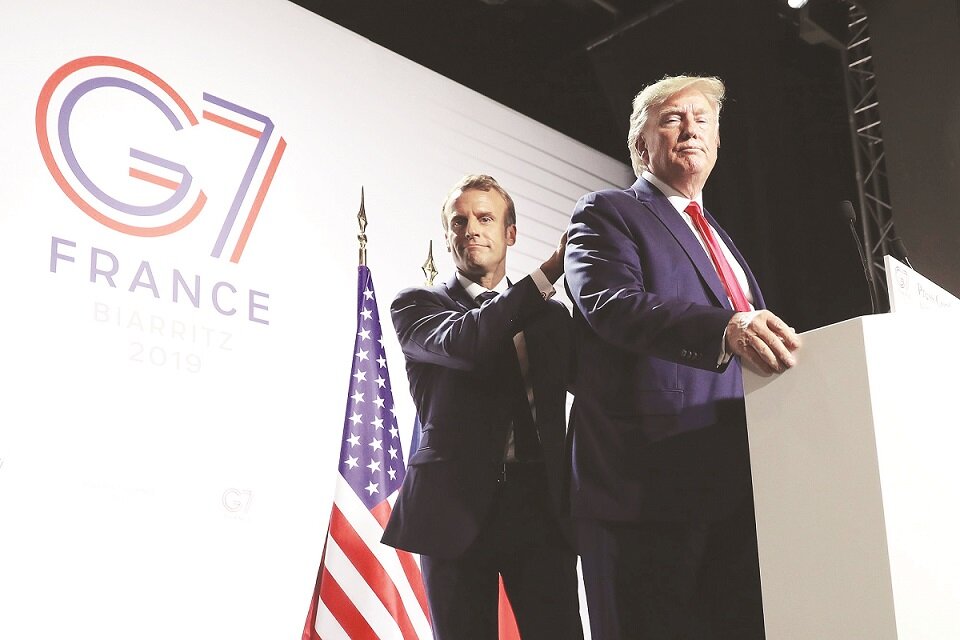Trumpism behind French face

TEHRAN – In an abrupt reversal of its Iran policy, France has struck a hardline tone on Iran, adopting more or less a Trumpian approach toward the Islamic Republic in a range of pressing issues such as the 2015 nuclear deal.
All this while, France has admitted that this approach did yield positive results under the Trump administration. French Foreign Minister Jean-Yves Le Drian recently said that the Trump administration’s sanctions campaign against Iran has failed to reduce tensions and resolve differences. However, the chief French diplomat raised a set of thorny issues that the Trump administration had used to justify its “failed” policy on Iran in the first place: Iran’s alleged pursuit of nuclear weapons, its defensive missile program and regional influence.
When President Donald Trump withdrew the United States from the Iran nuclear deal – officially known as the Joint Comprehensive Plan of Action (JCPOA)- on May 8, 2018, he claimed that the deal was flawed because it did not permanently restrict Iran’s nuclear program and curb its ballistic missiles and regional role.
Ever since, the European signatories to the JCPOA –France, Germany and the UK (E3)- have expressed regret over the U.S. decision to quit the nuclear deal, claiming to “tirelessly” work to preserve a deal they did nothing to save. Over the past two years, the E3 have put out countless statements regretting the U.S. approach toward Iran. But not any longer. They are now adopting the same approach a few weeks after the man who introduced it began leaving the White House.
In a recent interview with the Journal du Dimanche newspaper, Le Drian called for new talks with Iran on non-nuclear issues while accusing Iran of building a nuclear weapons capacity.
“Tough discussions will be needed over ballistic proliferation and Iran’s destabilization of its neighbors in the region,” the French foreign minister told the newspaper, according to a Reuters report.
He also echoed the position of German Foreign Minister Heiko Maas on the JCPOA, saying that the return of Iran and the U.S. to the nuclear deal would not be enough.
Le Drian said the so-called “maximum pressure” campaign against Iran increased the risk.
“The Trump administration chose what it called the maximum pressure campaign on Iran. The result was that this strategy only increased the risk and the threat,” he noted. “This has to stop because Iran and - I say this clearly - is in the process of acquiring nuclear (weapons) capacity.”
The French foreign minister followed in the footsteps of his German counterpart, who said the JCPOA was no longer enough.
“A return to the previous agreement will not suffice anyway. There will have to be a kind of ‘nuclear agreement plus,’ which is also in our interest. We have clear expectations of Iran: no nuclear weapons, but also no ballistic missile program that threatens the entire region. Iran also needs to play a different role in the region,” German Foreign Minister Heiko Maas said in a recent interview with the German magazine, Der Spiegel. He added, “We need this agreement precisely because we distrust Iran. I have already coordinated with my French and British counterparts on this.”
Le Drin’s remarks elicited a strong response from Iranian Foreign Minister Mohammad Javad Zarif. In two tweets on Sunday, Zarif told Le Drian to avoid making absurd remarks on Iran.
“E3 leaders—who rely on signature of OFAC functionaries to carry out their obligations under JCPOA—have done ZILCH to maintain JCPOA. Remember @EmmanuelMacron's stillborn initiative or UK non-payment of court-ordered debt? JCPOA is alive because of Iran and not E3, @JY_LeDrian,” Zarif tweeted.
He added, “Dear colleague: You kick-started your cabinet career with arms sales to Saudi war criminals. Avoid absurd nonsense about Iran. Reality check: YOU are destabilizing OUR region. Stop protecting criminals who chainsaw their critics and use YOUR arms to slaughter children in Yemen.”
The French foreign minister’s latest position on Iran was a clear break from Europe’s policy on Tehran over the course of the Trump administration. And this happened right after Joe Biden won the U.S. presidential election in November. Since then, France has been trying to fill the vacuum created in the region as a result of the Trump loss.
French President Emanuel Macron spoke by phone with Saudi Arabia’s Crown Prince Mohammad bin Salman earlier this week shortly before the publication of Le Drian’s remarks on Iran. The two leaders’ telephone conversation sparked speculation that France is planning to go hard with Iran to fill the vacuum left by Trump in the region and portray itself as the new protector of the Persian Gulf’s Arab states, whose leaders feel insecure after Trump’s departure.
The Saudi crown prince sought to tempt the French president into playing the role of Trump and becoming the protector of him instead of Trump, according to the Al-Alam news channel. Citing unknown observers, the news channel reported that bin Salman offered financial support for Macron and his party in the upcoming French election in exchange for Macron taking a hardline position against Iran, among other issues.
According to Al-Alam, the Saudis have demanded that the French take a tough stance toward Iran, convince Biden’s team not to return to the 2015 nuclear deal, try to mediate between bin Salman and President-elect Joe Biden, and try to persuade him to put on the shelf the issues of Muhammad bin Nayef, Jamal Khashoggi, Saad al-Jabri, jailed female activists, and the Yemen war.
“It seems that the French authorities have responded immediately to the first Saudi request [positively], which is to exert pressure on Iran and obstruct America's return to the nuclear deal. This was evident from Foreign Minister Le Drian's statements against Iran,” Al-Alam said.
